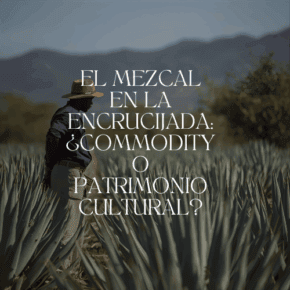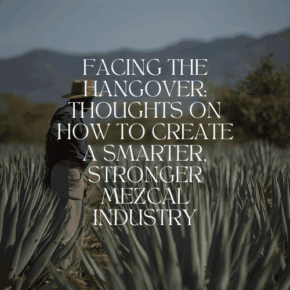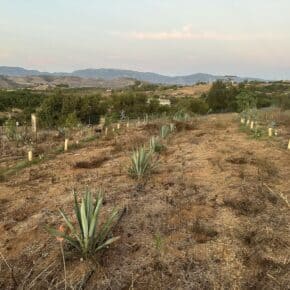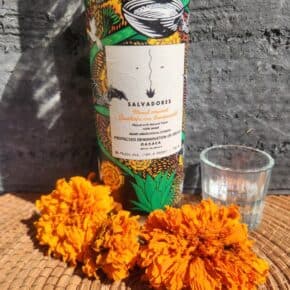
Just when we start really digging into the different ways to unpack the new NOM-70, Sombra Mezcal founder Richard Betts published this incredible piece. It’s a scoping piece of honesty and transparency from a mezcal brand. More than anything it’s incredibly refreshing – if we all could engage on this level all of the time the world would be a much better place.
He candidly assesses the mezcal landscape along with what he and Sombra have learned along the way. But most of all he charts a path forward. And because it comes in the midst of NOM-70 becoming law, it returns us to that conversation about the unintended consequences of the new NOM and the issue of sustainability.
“We’ve evaluated ‘tradition’ for its environmental impact, its sustainability, and its ethical considerations. In doing so, we have arrived at a vision for a brand new, 21st century palenque (distillery). We believe it is the future of thoughtful, environmentally friendly production (that also happens to makes great mezcal).”
So let’s review – NOM 70 lays out three categories of mezcal: Ancestral, Artesanal, and Mezcal. There are clear guidelines for what makes each category. But, here’s where it gets sticky – what if you are a brand that is producing for a large audience AND interested in being as environmentally friendly as possible? What if you recognize that the use of wood can be problematic – not only regarding the deforestation issue, but also the impact all of that smoke has on the air? As Betts discusses, keeping the wood in the roast is integral to maintaining the flavor, the uniqueness of what makes mezcal, mezcal. So they use certified sustainable wood. Mechanizing the crush processes, not by incorporating a chipper, but by mechanizing the tahona is a great solution – it reduces the chances of animal abuse and is incredibly efficient, while remaining completely traditional. Also traditional, the continued use of wild yeasts, rather than using packaged yeasts or accelerants to speed up the fermentation process. Thus far, Sombra’s production process remains both traditional and within the definition of Artesanal.
But here is where everything changes:
“Traditionally the stills are fired with wood. It’s certainly a remarkable thing to watch someone hone a wood fire just so and to coerce mezcal out of the still. But it’s important to really evaluate what’s happening in this process. Considering that the still is a closed system (meaning that no flavor is imparted by the wood fire), the wood is merely a heat source. So if the source of the heat doesn’t matter, why not choose a cleaner source?”
The clear choice is not use wood to fire the stills, but rather a clean delivery gas system. And for all the right environmental and sustainable reasons.
“We’re saving trees, distilling with better precision, making something more delicious and more consistent, and all with less waste, which is so important. Add to this the enormous benefit of cleaner air so our mezcaleros are not breathing smoke all day, which we all know is detrimental to one’s health. (If you’d like to read more about the impact of word burning you can do so here.)
By using gas to fire their stills Sombra is vaulted out of the Artesanal category and into that linguistically anodyne space of Mezcal. Suddenly Sombra is placed in the same category as Zignum and Beneva. This despite Sombra being infinitely more transparent than most of its company in that Mezcal category and being as environmentally friendly as possible while remaining traditional.
This sort of issue is exactly the sort of thing that came out of our November panel on sustainability. At the time we didn’t know whether gas fired stills would even be allowed in any of the recognized categories so we wrote:
Wood is so central to how mezcal has been traditionally made that you are required to use it while roasting the agave and firing your still in order to qualify as either “ancestral” or “artisanal” in the new Denominación definition. That means that the DO is writing pollution into the law. Raza pointed to a quick sustainability win “it’s a no brainer, switch to gas fired stills but not the agave roasting.” At a stroke you’ll remove one huge polluter and make a huge contribution to a more sustainable industry. But since burning wood is written into the DO and the market incentives to get yourself labeled an “ancestral” or “artisanal” mezcal are huge – I mean, wouldn’t you really rather call yourself the ‘Artisanal Mezcal’ instead of just “Mezcal”? So, everyone is going to have to keep polluting just to comply with the law and sell their product at the premium it deserves.
At that time gas fired stills hadn’t been included in the new NOM so it seemed very likely that this amazing bonus to sustainability in the mezcal world would be cast by the wayside. We’re incredibly happy to see it included, even if it is just within the Mezcal category. Now we move onto the next issue — how the NOM will be adapted and rolled out.
In the interim Sombra and others with similar campaigns are leading the charge in market differentiation and earnest fealty to sustainability and tradition. This is a fantastic example for any other brands who need to differentiate themselves within their new categories, we just have to keep making sure that green washing doesn’t come to define the NOM because it definitely already exists in some marketing campaigns. Here’s hoping that this kind of transparency pushes the industry towards more clarity, more creativity applied to making the process as sustainable as possible, so that consumers have more information to make their buying decisions.












We should be aware that the develpoment that Sombra has taken does apply to many new brands in the Mezcal world – and it is not a good one! Of course it is positive that people think about how to minimize the environmental effects of their doing. Especially when this has an economic background. At the same time we need to look at their history: A classic setting of a brand owner, foreign to the region, the people and their culture. And producers who have to comply with the demands of the outside world via this brand owner who wants them to work in a certain fashion which is not up to them to decide. Still this setting leaves money in the communities, but it is a first step to alter the original product. So we find producers distilling for a brand and somthing else for themselves/their community.
To leave the traditional communities and build distilleries for a certain brand will turn out to be fatal for Mezcal on the long run. Because it takes the product out of the hands of the people who have created it over centuries and leaves them to be employees. At its best. Even if you build a zero-emmission-super-high-end-but-yet-still-tradtional production site: It will be a foreign matter, consuming raw material, water, space etc that would have been available for the communities if Sombra would not be there.
We need to have a look at the traditional political and economic structure of the indigenous comunities to understand their products, of which Mezcal is one. All their activities have a very tightly laced network as a background to enable the community to survive. This implies a lot of economic parameters. To cut it short: If you drive your tahona with an electric engine nobody in the village will be able to rent a horse to the distiller and make some money of it (and please don´t come up with animal rights, we as westerns should keep our mouht shut, looking at our meat consumption and the way it is produced!). If less fire wood is needed there´s nobody to collect it and have a job. Of course we know that wood is a problem – but so are changes in the traditional production pattern than may result in the cultural incapacitation of the moral owners of Mezcal.
We need a few places like the new Sombra plant – to serve as an example! By the way, Los Danzantes distills with gas since 20 years, exactly for the reason that Sombra claims to be super innovative. And it is good that they have been copied. Actually it should be the task of institutions like the CRM to make experiments on that field and make the results available to the traditional distillers.
But a bigger development of Mezcal brands, that are in the hands of people from outside the production region, building their own distilleries while leaving aside the traditional producers will endanger Mezal as we know it – no matter what they will say how good they are!
modernization is unavoidable, yet progression & enviromental evolution must be observed. Attention to detail is what is important as well as not adulterating the product for commercial gain. Mezcal is at crossroads of sorts and it is the responsibility of the producer/brand to respect the unwritten laws. I have attached a video of a fine production with a modernized tahona to eliminate animal stress and observe cleanliness- A wood fired still should be required in my perspective—
https://eltinieblo.squarespace.com/origin/
i approve of the CRM and love that they are guiding the spirit through the future as it becomes available for larger markets.
modernization is unavoidable, yet progression & enviromental evolution must be observed. Attention to detail is what is important as well as not adulterating the product for commercial gain. Mezcal is at crossroads of sorts and it is the responsibility of the producer/brand to respect the unwritten laws. I have attached a video of a fine production with a modernized tahona to eliminate animal stress and observe cleanliness-
https://eltinieblo.squarespace.com/origin/
i approve of the CRM and love that they are guiding the spirit through the future as it becomes available for larger markets.